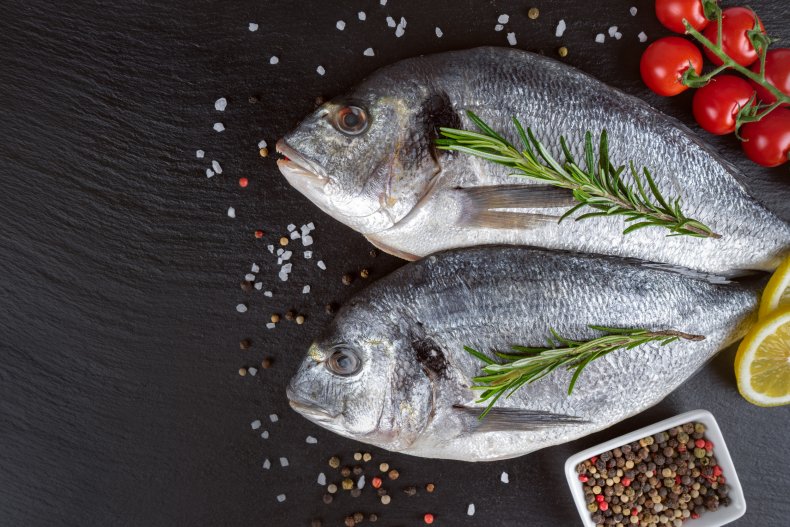
Why the Pesco-Mediterranean Diet Is the Right Choice for a Healthier Lifestyle
If you’re looking to cut down on meat consumption—but becoming vegetarian or vegan feels like too big of a jump—a Pesco-Mediterranean diet might be your best bet.
The mostly plant-based diet can still satisfy your animal protein fix, while offering a host of benefits to promote a healthier lifestyle.
So what’s in a Pesco-Mediterranean Diet and is it really the best choice for your health?
What Is a Pesco-Mediterranean Diet?
A Pesco-Mediterranean diet is essentially the Mediterranean diet combined with fish and seafood as your main animal food sources.
A Mediterranean diet (made mostly of plant-based foods, with olive oil being the primary source of added fat) is based on the traditional cuisines of Greece, Italy and other countries bordering the Mediterranean Sea, the Mayo Clinic explains.
A typical Mediterranean diet pattern entails the following key aspects, according to the Mayo Clinic:
- Forms meals around vegetables, beans and whole grains.
- Eat fish at least twice a week.
- Use olive oil instead of butter when cooking.
- Serve fresh fruit for dessert.
The foundation of a Pesco-Mediterranean diet usually consists of vegetables, fruits, nuts, seeds, legumes, whole grains, as well as extra-virgin olive oil, fish, seafood and fermented dairy products.

iStock/Getty Images Plus
Pesco-Mediterranean Diet Health Benefits
Speaking to Newsweek, Katherine Zeratsky, a registered dietitian nutritionist (RDN) at the Mayo Clinic, said the Pesco-Mediterranean diet “follows the positive trend of the benefits of the traditional Mediterranean diet.”
It’s also important to note that before making any changes to your diet, it’s always best to consult with a RDN first as “a RDN can help you identify the best eating pattern to match your unique needs,” Roxana Ehsani, a RDN and national media spokesperson for the Academy of Nutrition and Dietetics, told Newsweek.
Reduces Meat Consumption
As it entails eating more fish and seafood, the Pesco-Mediterranean diet reduces your meat consumption, including red meat and processed meats, which are both “pro-inflammatory” and raise “bad” LDL (low-density lipoprotein) cholesterol levels, Ehsani warned.
Zeratsky explained red and processed meats are a significant source of saturated fat. Processed meats tend to be high in sodium and other additives that may dilute nutritional quality.
“On the opposite spectrum, fish intake, often attributed to the healthier fats, have been shown to decrease coronary artery disease and sudden cardiac death and may also benefit other systems in our body such as brain health and lowering cancer risk,” Zeratsky noted.
Fatty fish (such as mackerel, herring, sardines, albacore tuna and salmon) are rich in omega-3 fatty acids, which are polyunsaturated fats that help fight inflammation in the body.
…And Risk of Heart Conditions
Zeratsky said consuming red and processed meat in greater quantity and/or frequency has been linked to a greater risk of cardiovascular disease and colon cancer.
A 2020 study in the peer-reviewed Journal of American College of Cardiology (JACC) noted that higher fish consumption (as long as it’s not fried fish) has been associated with a reduced risk of heart failure and a drop in the incidence of metabolic syndrome (a cluster of conditions occurring together, raising your risk of heart disease, stroke and type 2 diabetes).
Ehsani also warned that high consumption of meat can be harmful to brain health.
The Mayo Clinic says the omega-3 fatty acids found in fatty fish help reduce triglycerides (a type of fat in your blood) and blood clotting as well as the risk of stroke and heart failure.
In a 2018 Science Advisory, the American Heart Association recommended people to have one to two seafood meals per week to “reduce the risk of congestive heart failure, coronary heart disease, ischemic stroke and sudden cardiac death.”

iStock/Getty Images Plus
…And ‘Bad’ Cholesterol
A Pesco-Mediterranean diet emphasizes “heart healthy fats,” such as olive oil, Ehsani said.
“Olive oil is a monounsaturated fat, which can help lower the bad LDL cholesterol and raise the good HDL [high-density lipoprotein] cholesterol,” she explained.
Good Source of Low-fat Protein
Low in saturated fat, seafood makes an excellent source of protein. Seafood contains essential omega-3 fats, which are “heart and brain healthy fats,” Ehsani said.
Eggs also form part of the traditional as well as the Pesco-Mediterranean diet. Zeratsky explained: “Eggs are a good source of many nutrients but two that are of particular interest are lutein and zeaxanthin, carotenoids—types of antioxidants. They are thought to play a role in brain and eye health.”

iStock/Getty Images Plus
…And Healthy Fats
Nuts and seeds also form a regular part of a Pesco-Mediterranean diet. Not only are they both an excellent source of healthy fats, they’re also rich in dietary fiber and provide a lean source of protein, Ehsani noted.
According to the 2020 JACC study, trial groups that consumed a Mediterranean diet supplemented with nuts or extra virgin olive oil had “statistically significant reductions of 29 percent for major adverse CVD [cardiovascular disease] events—myocardial infarction (MI), stroke, and death from these causes—and 42 percent for stroke,” compared with groups on a simple low-fat diet.

iStock/Getty Images Plus
…And Vitamin D
Ehsani also highlighted that seafood is also a good source of vitamin D, a nutrient which most people are deficient in, she said.
Zeratsky explained: “Some fish are a source of vitamin D, a nutrient scarce in most foods in their natural state. Vitamin D is recognized for its importance in bone health but may have a role in many functions in our body.”
Weight Control
Zeratsky said a diet of whole grains, beans/legumes (pulses), vegetables, fruits, and nuts is high in fiber, which keeps our gastrointestinal tract healthy and is helpful in managing blood glucose. Fiber also impacts our satiety. “Hunger and calorie control are often in check with a higher intake.”
The Pesco-Mediterranean diet features healthy fats and fats also play a role in satiation, she added.
“When we are full and satisfied from the fiber, this can result in a sustainable, healthy, calorie controlled diet that keeps our weight in check.
“Weight seems to be a factor in many chronic diseases. That said, if eating this way doesn’t move the scale, it’s still a nutritious and health promoting diet,” Zeratsky said.
The Pesco-Mediterranean diet focuses on fish as a source of protein. “Protein too has a satiating effect and can be helpful in hunger and calorie control,” she explained.
High in Nutrient-Dense Foods
A Pesco-Mediterranean diet is rich in fruits and vegetables, which are the “most nutrient dense food,” full of vitamins, minerals, dietary fiber and antioxidants. They are also generally low in calories, which supports your overall health, Ehsani said.
Zeratsky said: “Particularly, potassium, magnesium and in some of these foods, calcium, are key nutrients in blood pressure control.”

iStock/Getty Images Plus


